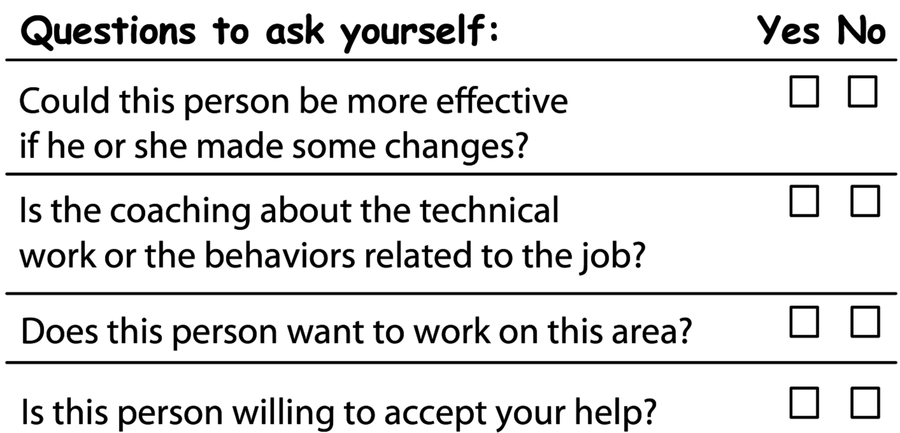Technique: Guidelines for Effective Coaching
Part of a manager’s job is to coach his or her direct reports to increase their capability and effectiveness within the organization. Coaching can focus on either interpersonal skills or technical work that is relevant to the job.

Figure 9. Coaching checklist
Coaching is different from feedback and from mentoring. As a manager, you are obligated to provide feedback when someone is not performing some aspect of his or her job. Mentoring is a voluntary relationship that works better when there isn’t a reporting relationship. Coaching is part of your choice as a manager to help people increase some capability.
Coaching is part of a manager’s job, too, but coaching focuses on increasing skills and capability. You may coach someone who has decided to work on a performance issue, or you may coach to develop new skills and insights. In either case, coaching is a helping relationship, so make sure the other person wants your help. Advice inflicted without consent is seldom valued. Unless you can answer “yes” to all the questions in Figure 9, Coaching checklist, refrain from inflicting help.
Guidelines for coaching:
-
Make sure you’ve provided timely and effective feedback.
-
Ask whether the person wants coaching or offer to provide helpful information.
-
Engage in conversation to articulate how new skills or behaviors would increase effectiveness.
-
Discuss additional options, alternatives, or strategies. People usually choose the best alternative they know—but may have a limited repertoire. Coaching helps increase the range of effective options from which to choose. We have found questions like these help people generate options:
-
What problem are you trying to solve?
-
What are the benefits of taking that option?
-
What could go wrong if you take that option?
-
Who else is affected by that option?
-
What alternatives did you consider?
-
What are two other ways to accomplish this goal?
-
How could we make the situation worse?
-
If we could do only one small thing, what would it be?
-
How would an engineer, marketing person, salesperson, or tester (choose a role different from your role) look at this?
-
Where do we get the greatest leverage?
-
-
Discuss the implications of each option. Don’t lead to a particular outcome; instead, encourage exploration of each option from the perspective of the person you are coaching. Share your perspective but allow the person you are coaching to select the option that suits his or her needs.
-
Develop an action plan.
-
Follow up each week in your one-on-one meeting. Recognize successes. Analyze less successful attempts at trying new skills and behaviors. Look for ways to refine and enhance what did work and correct what didn’t.
